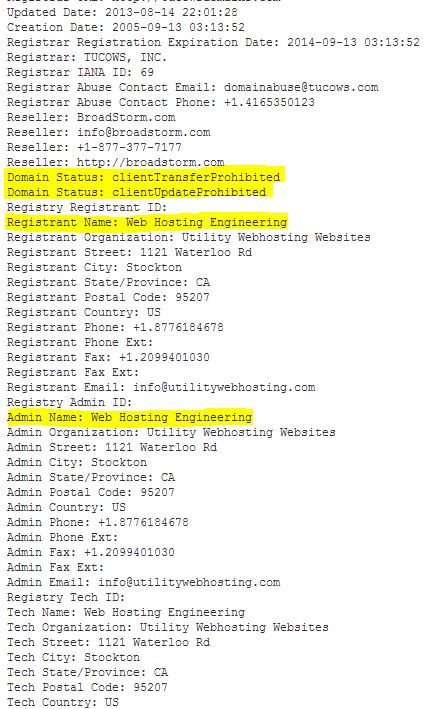Best Practices When Registering a Domain Name
So many times we’ve seen a website owner struggling to manage their domain name registration because best practices weren’t used when it was originally registered. In many cases it was simply not knowing what the best practice is, or having paid a web designer to both create your site and register your domain name.
There are 4 contacts of record, and an optional 5th, with any domain registration. Whether you have paid for domain privacy or not will determine whether all of these contacts are visible. Many companies pay for domain privacy simply to stop all of the fake invoices that come in the mail from other registrars trying to get you to pay them and thereby moving your domain to that registrar, but that’s another subject.
The first contact is the Registrar, this is the body that maintains your domain’s registration information. They are the company that shows your domain is registered to you and not available for anyone else to take. The registrar also provides the nameserver information to people on the Internet so people will be able to get the information about how to get to services using your domain. The most common things would be getting to your website or delivering email.
The second contact, is the optional one, and it is the Reseller. The reseller is who you pay annually, every 5 years, etc, for registration of your domain name, they in turn register your domain through the Registrar. This is hidden when domain privacy is purchased. If you purchased directly through a registrar, the Reseller will not be included.
The third contact is the Registrant which is wise to have as you as this contact’s authority supersedes the Admin contact, but this is often listed as either the ISP or web developer who initially registered the website for you.
The 4th contact is the most important, and it should be YOU! This is the location for the Admin contact for the domain name; it’s your name, if you want to have control of it this has to be your name and your company information. You have a falling out with your web developer and want to transfer your domain name to a new Registrar or change nameservers, you may be out of luck if they’re the Admin contact. Because guess who it looks like owns that name, not you. More about this in a moment.
The 5th contact is the Tech contact and this should either be the ISP you’re hosting with or your web developer. This is the person that is often contacted when there are technical issues with the domain. This can include spam complaints, compromised web script reports, etc.
Back to what happens when you aren’t the Admin contact. See an example below.
The domain in question doesn’t matter, do a few whois searches and you’re bound to find this kind of situation. What matters is this domain was registered by the ISP, not using best practices and now as a result of a billing dispute (that has nothing to do with the domain itself) this domain is locked. (Domain transfers can be denied by the current Registrar for, “Non payment for previous registration periods…” Making it clear that this is a very narrow reason for refusing a transfer.) This company would like to transfer their domain away from Utility Webhosting Websites, but they have locked the domain from Transferring. Worse, by appearances, the company does not own the domain name because they are not the Admin contact, nor are they the Registrant.
So what do they do now? Typically this process would have a Form of Authorization (FOA) obtaining authorization from Registrant or Admin contact to transfer the domain. Well that isn’t going to help here, the Registrant/Admin are the ones who put the lock on the domain in the first place. This is your domain, your company’s website, you’ve been paying for both for years, but you’re stuck with what would seem to be more of a clerical error, your name doesn’t list you as the owner. The owner as it’s registered is Utility Webhosting Websites. This is the heart of the problem!
From ICANN (Internet Corporation for Assigned Names and Numbers), the governing body who handles domain name disputes including transfer disputes and Intellectual Property disputes, “The Administrative Contact and the Registered Name Holder…are the only parties that have the authority to approve or deny a transfer request to the Gaining Registrar. In the event of a dispute, the Registered Name Holder’s authority supersedes that of the Administrative Contact.”
Let’s say a billing dispute had arisen that had nothing to do with the domain name, and the ISP had used that as an excuse to lock the domain, but the Registrant and Admin contacts were the company who registered the domain name, this becomes a fairly easy filing with ICANN to get the domain named transferred. An FOA has been completed and the complaint against the loosing Registrar is filed. The Registry Operator who reviews the documents will issue the decision within 14 days and as long as the t’s are crossed and i’s dotted the transfer will be forced to the new Registrar. This process is fairly simple as ICANN is clear, that as far as issues of billing, domain transfers can be denied by the current Registrar only for, “No payment for previous registration periods (including credit card charge-backs) if the domain name is past it’s expiration date or for previous or current registration periods if the domain name has not yet expired.” ICANN goes on to say that “Nonpayment for a pending or future registration period” is not an acceptable reason for the change of Registrar to be denied.
However, without the proper contacts in the Registrant and Admin contact there is no FOA and without an FOA the resolution is much more complicated and may in the end still be denied as it requires finding a way to prove you are the legitimate registered owner of the domain name in question. ICANN reiterates time and again ” If the Gaining Registrar is unable to provide a complete FOA with data matching that contained within the authoritative Whois database at the time of the transfer request…” the transfer shall be denied or reversed depending on how events occurred. This makes the next steps taken, in conjunction with appealing to ICANN, other court proceedings to prove your domain name is indeed your Intellectual Property and not the property of the existing Registrant / Admin.
Before you find yourself in a difficult situation needing to prove you are indeed the owner of your domain name(s), make sure you Registry information is correct and you are listed as the Registrant and Admin contacts. If you’re not sure how it’s currently listed do a Whois on your domain name. From there if you need to make any corrections or updates get it taken care of right away! It’s not a headache worth having when it’s a simple fix right now!
[whohit]WhoisAdmin[/whohit]




4 Comments
I couldn’t refrain from commenting. Perfectly written!
Hi there, I enjoy reading through your article.
I wanted too write a little comment to support you.
I enjoy what you guys are usually up too. This type of clever work and reporting!
Keep up the amazing works guys I’ve you guys to my blogroll.
I seldom leave a response, however i did some searching
and wound up here Best Practices When Registering a Domain Name